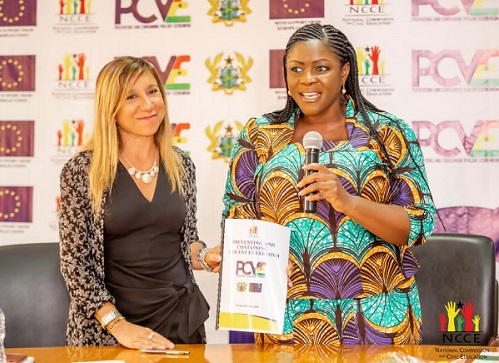
The National Commission for Civic Education (NCCE) has launched a project to build community resilience towards the prevention and control of violent extremism and terrorism in Ghana.
The “Prevention and Containment of Violent Extremism (PCVE)” project would be implemented in 63 selected districts in the five Northern regions namely Northern, Upper East, and West, Savannah and North East and three border regions; Oti, Bono and Bono East.
Funded by the European Union (EU) to the tune of 1.7 million euros, the project, spanning the next 18 months, is expected to intensify public awareness on the imminent threat to preserve the peace and social cohesion currently enjoyed in the country.
Chairperson of the Commission, Kathleen Addy at a signing ceremony in Accra yesterday to kick-start the project said, it was a follow-up to an earlier project dubbed; “Preventing Electoral Violence and Providing Security to the Northern Border Regions of Ghana (NORPREVSEC)” which assessed knowledge gaps on the issue of terrorism and violent extremism.
She said under the PCVE, interventions would target state and non-state actors at all levels to increase awareness on the threat and detect red flags, encourage desirable attitudes and behaviours among individuals at risk of joining violent groups and ensure that citizens safeguard their communities from violent extremists and terrorists.
“We know from experience of other countries that when terrorists gain a foothold in your country, it leads to breakdown of social order and increased human suffering as a result of brutal acts of violence meted out to ordinary people.
Through this project, our ultimate objective is that we will not cede one heart, one mind or support from any Ghanaian or person resident in Ghana to terrorists. We hope to win the battle for hearts and minds to ensure that not a single Ghanaian or resident of any community is swayed by any indoctrination to become allies of terrorists.”
Ms Addy called on all citizens to support efforts in preventing elements that derail national security urging that people be more watchful, vigilant and prepared to take responsibility of their security and that of the state as a whole.
“The threat of violent extremism is a nationwide threat and it is our hope that government will deem it fit to provide the needed resources in order for the NCCE to expand its scope for the project to cover the entire country,” she urged.
The Head of the EU Delegation in Ghana, Irchad Razaaly said there was a lot of work to be done in countering violent extremism judging from the complex dynamics it had taken in recent times.
According to him, the NCCE approach to tackling the menace was laudable adding; “a well-educated and empowered society immune to destructive narratives and capable of resolving its internal differences in amicable and peaceful manner can move itself away from the dangers of radicalisation and rise of violence.”
Mr Razaaly expressed the EU’s commitment to supporting the NCCE to tackle the root cause of violent extremism and terrorism among the Ghanaian society.
The Executive Secretary of the Ghana National Commission on Small Arms and Light Weapons (NACSA), Ms Afi Yakubu indicated that an estimated one billion small arms and light weapons were in circulation and in the hands of ‘wrong people’ globally.
She said, in Ghana, over 1.1 million arms were unregistered and in the hands of civilians per a 2014 study conducted by the Kofi Annan International Peacekeeping Training Centre (KAIPTC) and that made the country highly prone to attacks.
She called for concerted efforts to deal with the looming threat saying; “where peace and security is undermined, its spillover effect knows no bound.”
BY ABIGAIL ANNOH






